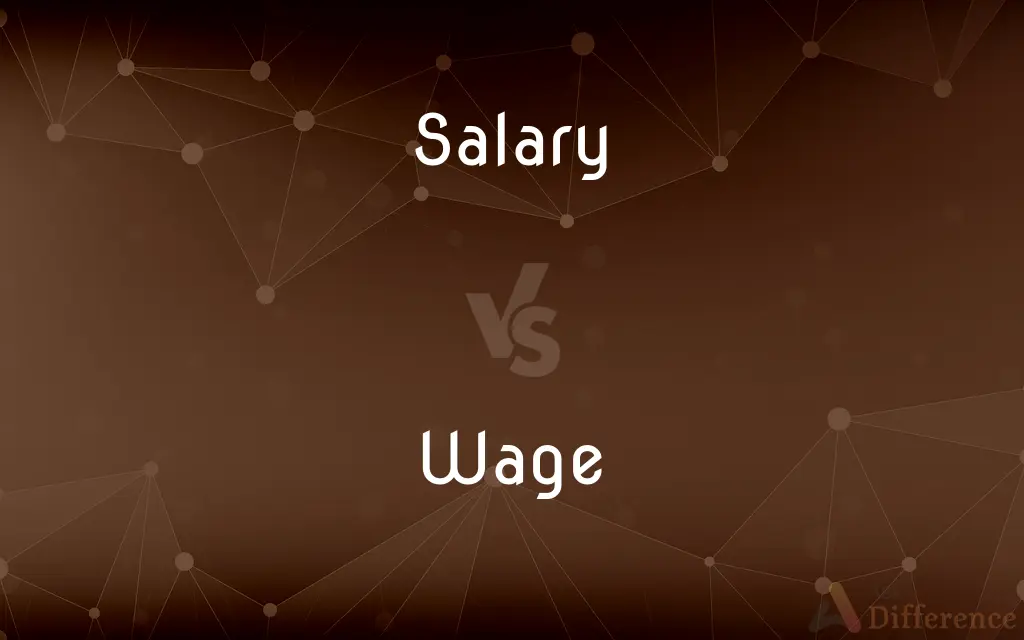Salary vs. Wage — What's the Difference?
By Tayyaba Rehman & Maham Liaqat — Updated on March 19, 2024
Salary is a fixed annual income regardless of hours worked, while a wage is typically an hourly rate paid for each hour worked.

Difference Between Salary and Wage
Table of Contents
ADVERTISEMENT
Key Differences
Salaries are usually associated with white-collar jobs where employees are paid a fixed amount annually. This system offers stability as it's not influenced by the number of hours worked. On the other hand, wages are common in blue-collar roles, where employees are compensated based on the actual hours they work, often leading to variability in their paychecks.
While salary earners might receive their pay monthly or bi-monthly regardless of the specific hours they put in, wage earners are paid weekly or bi-weekly, primarily reflecting the actual hours worked. This distinction means wage earners have a direct correlation between working hours and pay, unlike their salaried counterparts.
Salary packages often include benefits like health insurance, retirement contributions, and paid leave, providing a level of security and added value. Whereas wage earners might not always have access to such comprehensive benefits, making their overall compensation package potentially less stable.
Salaried positions typically imply a higher level of responsibility and a role that's not easily quantified by hours, such as managerial or professional jobs. In contrast, wage positions are often more task-oriented, with clear expectations for hours worked and tasks completed.
The concept of overtime pay also differs; salaried employees usually don't receive extra pay for additional hours worked, considering their fixed annual income. However, wage earners are often eligible for overtime pay, providing financial incentive for extra hours worked beyond the standard workweek.
ADVERTISEMENT
Comparison Chart
Payment Basis
Fixed annual income
Hourly rate
Pay Frequency
Monthly/bi-monthly
Weekly/bi-weekly
Overtime Pay
Typically not eligible
Often eligible
Job Type
Often white-collar, managerial
Usually blue-collar, task-oriented
Benefits
More likely to include comprehensive benefits
Less likely to have extensive benefits
Compare with Definitions
Salary
A fixed regular payment, typically paid on a monthly or bi-monthly basis but expressed as an annual sum.
Jane's salary as a marketing manager is $75,000 per year.
Wage
A payment usually based on hours worked, often received weekly.
Mike earns a wage of $20 per hour as a carpenter.
Salary
Annual income not dependent on hours worked.
Regardless of overtime, Alex's salary remains consistent.
Wage
Directly correlates with the amount of work done.
Emma's weekly wages increase with overtime.
Salary
Not directly tied to the quantity of work performed.
As a salaried employee, Ryan sometimes works weekends at no extra pay.
Wage
Overtime pay is typically available.
Overtime hours boost Tom's wages significantly.
Salary
Often associated with professional or managerial positions.
Salaries are common in careers requiring advanced degrees.
Wage
Common in blue-collar and service industry jobs.
Most restaurant servers are paid an hourly wage.
Salary
May include additional benefits like health insurance.
Sara's salary package includes a generous health plan.
Wage
May fluctuate based on hours worked each pay period.
Lucy's wages vary each week depending on her shifts.
Salary
A salary is a form of periodic payment from an employer to an employee, which may be specified in an employment contract. It is contrasted with piece wages, where each job, hour or other unit is paid separately, rather than on a periodic basis.
Wage
A wage is the distribution from an employer of a security (expected return or profits derived solely from others) paid to an employee. Like interest is paid out to an investor on his investments, a wage is paid (from company earnings) to the employee on the employee's invested assets (time, money, labor, resources, and thought).
Salary
A fixed regular payment, typically paid on a monthly basis but often expressed as an annual sum, made by an employer to an employee, especially a professional or white-collar worker
He received a salary of £24,000
A 15 per cent salary increase
Wage
A regular payment, usually on an hourly, daily, or weekly basis, made by an employer to an employee, especially for manual or unskilled work.
Salary
Pay a salary to
The Chinese system—salary the doctor and stop his pay when you get ill
Wage
Wages The price of labor in an economy.
Salary
Fixed compensation for services, paid to a person on a regular basis.
Wage
Often wages (used with a sing. or pl. verb) A fitting return; a recompense
The wages of sin.
Salary
A fixed amount of money paid to a worker, usually calculated on a monthly or annual basis, not hourly, as wages. Implies a degree of professionalism and/or autonomy.
Wage
To engage in (a war or campaign, for example).
Salary
To pay on the basis of a period of a week or longer, especially to convert from another form of compensation.
Wage
(often in plural) An amount of money paid to a worker for a specified quantity of work, usually calculated on an hourly basis and expressed in an amount of money per hour.
Salary
(obsolete) Saline.
Wage
To wager, bet.
Salary
Saline
Wage
To expose oneself to, as a risk; to incur, as a danger; to venture; to hazard.
Salary
The recompense or consideration paid, or stipulated to be paid, to a person at regular intervals for services; fixed wages, as by the year, quarter, or month; stipend; hire.
This is hire and salary, not revenge.
Wage
To employ for wages; to hire.
Salary
To pay, or agree to pay, a salary to; to attach salary to; as, to salary a clerk; to salary a position.
Wage
(transitive) To conduct or carry out (a war or other contest).
Salary
Something that remunerates;
Wages were paid by check
He wasted his pay on drink
They saved a quarter of all their earnings
Wage
(transitive) To adventure, or lay out, for hire or reward; to hire out.
Wage
To give security for the performance of
Wage
To pledge; to hazard on the event of a contest; to stake; to bet, to lay; to wager; as, to wage a dollar.
My life I never but as a pawnTo wage against thy enemies.
Wage
To expose one's self to, as a risk; to incur, as a danger; to venture; to hazard.
To wake and wage a danger profitless.
Wage
To engage in, as a contest, as if by previous gage or pledge; to carry on, as a war.
[He pondered] which of all his sons was fitTo reign and wage immortal war with wit.
The two are waging war, and the one triumphs by the destruction of the other.
Wage
To adventure, or lay out, for hire or reward; to hire out.
Wage
To put upon wages; to hire; to employ; to pay wages to.
Abundance of treasure which he had in store, wherewith he might wage soldiers.
I would have them waged for their labor.
Wage
To give security for the performance of.
Wage
To bind one's self; to engage.
Wage
That which is staked or ventured; that for which one incurs risk or danger; prize; gage.
Wage
That for which one labors; meed; reward; stipulated payment for service performed; hire; pay; compensation; - at present generally used in the plural. See Wages.
By Tom Thumb, a fairy page,He sent it, and doth him engage,By promise of a mighty wage,It secretly to carry.
Our praises are our wages.
Existing legislation on the subject of wages.
Wage
Something that remunerates;
Wages were paid by check
He wasted his pay on drink
They saved a quarter of all their earnings
Wage
As of wars, battles, or campaigns;
Napoleon and Hitler waged war against all of Europe
Common Curiosities
What defines a salary?
A salary is a fixed annual income that remains constant regardless of hours worked.
How is a wage different from a salary?
A wage is an hourly rate paid for each hour worked, often resulting in variable paychecks.
Can wage earners receive benefits similar to salaried employees?
While possible, wage earners are less likely to have extensive benefits compared to salaried employees.
Are salaried employees entitled to overtime pay?
Salaried employees are typically not eligible for overtime pay, as their income is fixed.
Is one form of compensation better than the other?
The "better" compensation depends on individual needs, job stability, and preference for fixed or variable income.
How often do wage earners get paid?
Wage earners are usually paid weekly or bi-weekly, reflecting the hours worked.
Are all professional jobs salaried?
While many are, not all professional jobs offer salaries; some may pay wages, especially in flexible or part-time roles.
Can overtime hours affect a salary?
No, salaries are fixed and not typically influenced by overtime hours worked.
Do salaried positions require more responsibility?
Salaried positions often entail a higher level of responsibility and are not easily quantifiable by hours.
Do salaries include benefits?
Salaries often come with benefits like health insurance and retirement contributions.
What types of jobs usually offer wages?
Wage jobs are often task-oriented and include blue-collar and service industry roles.
Can a part-time job offer a salary?
Rarely, as salaries are typically reserved for full-time, permanent positions.
How does job security compare between salaried and wage-earning positions?
Salaried positions often offer greater job security due to the nature of the contract and benefits, but this can vary widely by industry and role.
Is it possible to negotiate for a salary in a traditionally wage-paying job?
It's possible but depends on the job's nature, the employer's policies, and individual negotiation.
How does paid leave work for wage earners?
Paid leave for wage earners can vary and might not be as straightforward or guaranteed as for salaried employees.
Share Your Discovery

Previous Comparison
Solely vs. Wholly
Next Comparison
Bedbound vs. BedfastAuthor Spotlight
Written by
Tayyaba RehmanTayyaba Rehman is a distinguished writer, currently serving as a primary contributor to askdifference.com. As a researcher in semantics and etymology, Tayyaba's passion for the complexity of languages and their distinctions has found a perfect home on the platform. Tayyaba delves into the intricacies of language, distinguishing between commonly confused words and phrases, thereby providing clarity for readers worldwide.
Co-written by
Maham Liaqat













































